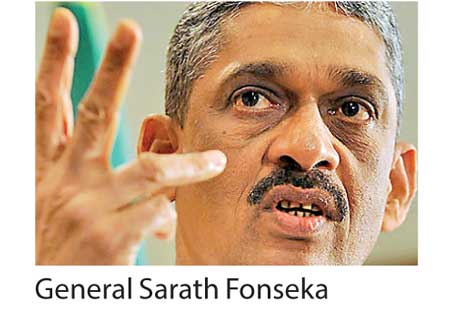Wednesday Feb 25, 2026
Wednesday Feb 25, 2026
Wednesday, 20 September 2017 00:05 - - {{hitsCtrl.values.hits}}
AFP: Sri Lanka’s ex-army chief Sarath Fonseka Tuesday said he had been denied a visa to attend the UN general assembly because of unresolved war crime allegations against the military.
 The war-time general, who is now minister of regional development, said he was due to travel to New York this week, but he was the only one in the Sri Lankan delegation not issued a visa.
The war-time general, who is now minister of regional development, said he was due to travel to New York this week, but he was the only one in the Sri Lankan delegation not issued a visa.
Fonseka said he could not accompany President Maithripala Sirisena who left Colombo on Sunday to address the United Nations General Assembly.
“I was not given a visa because of the war crimes allegations against the military,” Fonseka told reporters. “That is why I say they must be investigated.”
He said the excesses by a “few” during the final stages of the island’s Tamil separatist war should not tarnish the image of the Sri Lankan armed forces.
The military crushed separatist Tamil Tiger rebels in May 2009 following a no-holds-barred offensive that also triggered allegations against the forces of killing at least 40,000 Tamil civilians.
The Government at the time insisted that no civilians were killed by its troops and faced international censure over its dismal human rights record.
Fonseka, who led the military, has maintained that he did not order troops to target civilians, but has acknowledged that there may have been excesses that should be investigated.
The new Government, which came to power in January 2015, promised investigations but those are yet to begin.
Earlier this month Fonseka accused his successor Jagath Jayasuriya of committing crimes against Tamil rebel suspects during and after the island’s ethnic war and said he was ready to testify against the former military commander.
A human rights group filed two complaints in Colombia and Brazil against Jayasuriya, who was Sri Lanka’s ambassador to several South American countries until recently.
The group alleged that Jayasuriya oversaw torture camps and was responsible for hundreds of disappearances and extrajudicial killings in the final stages of the conflict when he was a senior officer.
The UN has estimated that at least 100,000 people were killed between 1972 and 2009.
Tiger rebels have been accused of using human shields and killing civilians in their guerrilla war for a separate homeland for the minority ethnic Tamil community in the Sinhala-majority nation.